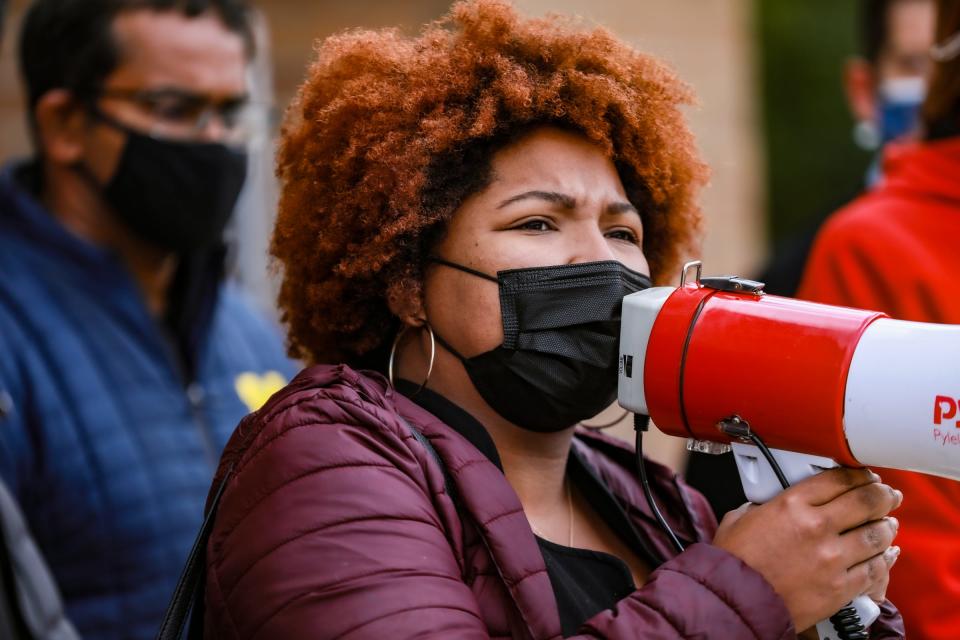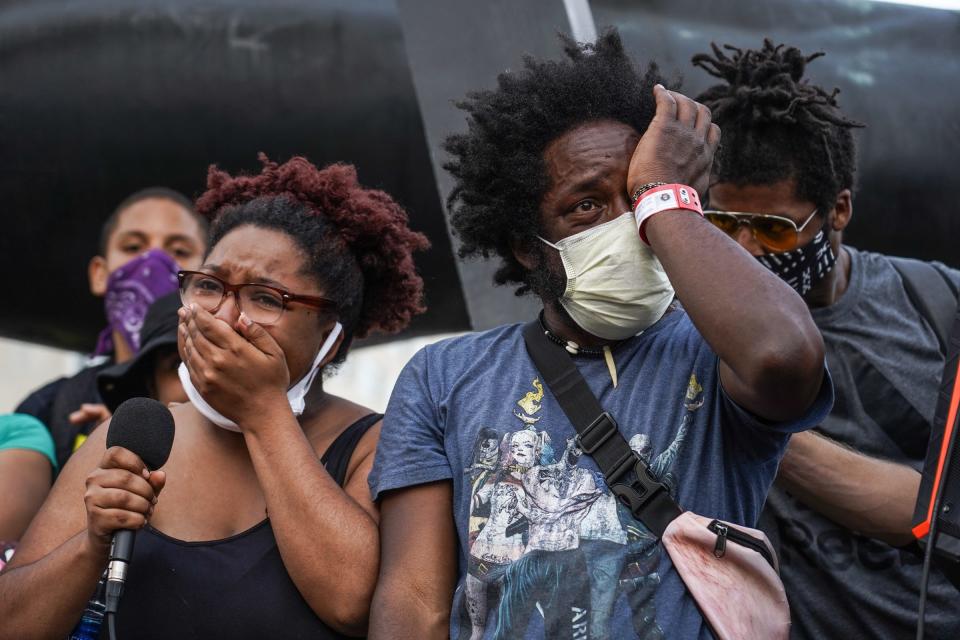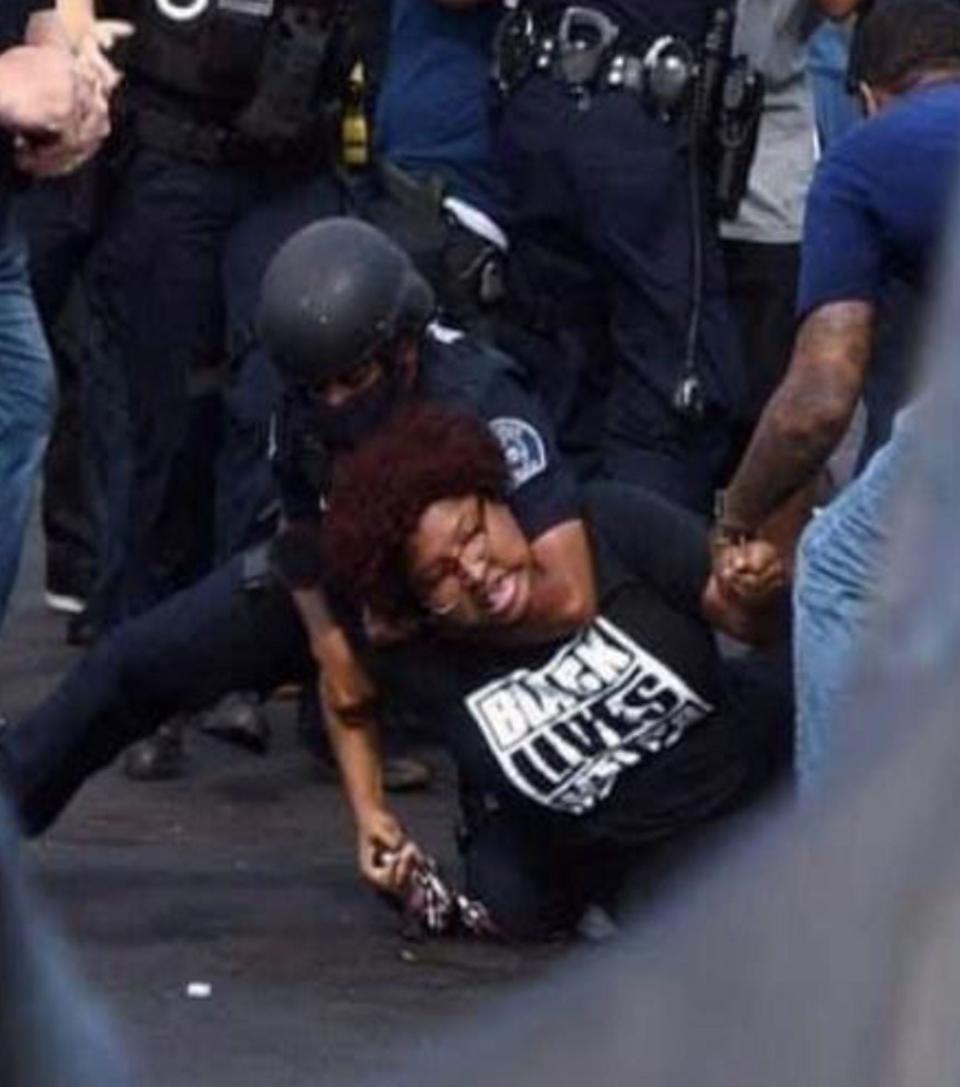Opinion: Detroit is going to extraordinary measures to convict leaders of 2020 protests
The City of Detroit wants Nakia Wallace convicted of something. That much is clear.
For the last three years, the city has taken extraordinary measures to charge Wallace, a leader of the 2020 protests against police brutality, with crimes related to those protests, most recently, misdemeanor charges of blocking traffic and interfering with a city employee.
Wallace, a 26-year-old Detroiter, was back in court Thursday, arguing that the city's quest to convict her of the misdemeanors constitute vindictive prosecution, motivated by her role as an organizer — and because she was a plaintiff in a successful civil lawsuit accusing the Detroit Police Department of using brutal tactics in policing that summer's protests, causing injury to protesters.
Those aggressive street tactics have become aggressive prosecution of Wallace, Tristan Taylor and other Detroit Will Breathe leaders, even after charges against most protesters were dropped.
When asked to explain the resources dedicated to the ongoing prosecutions, Detroit officials offered only a brief statement, saying its actions were "proper and appropriate."
But Wallace believes the city's motives are simple: To quell dissent, making clear that protest against police in this town comes at too high a cost.
A city task force looked through hours of video
After the 2020 murder of George Floyd by Minneapolis police, Wallace formed the organization Detroit Will Breathe with Taylor and other activists, leading 100 consecutive nights of largely peaceful marches.

From the first protest, on May 29, 2020, Detroit police moved forcefully to shut the protests down. Standoffs between police and protesters became familiar sights — and so did aggressive police tactics intended to clear the streets. Video from those early protests are shocking: Police lobbing cannisters of tear gas and liberally wielding pepper spray, aggressive take downs of protesters, seemingly indiscriminate mass arrests.
DPD arrested and charged hundreds of protesters that summer, including Wallace and Taylor, mostly with misdemeanor violations of the city's 8 p.m. curfew and with the catch-all crime of disorderly conduct. Such charges carry a fine of up to $500, up to 90 days in jail, or both ― and, of course, the stigma of a criminal record.
Wallace's attorney, Nancy A. Parker of the Detroit Justice Center, a member organization of the Detroit Coordinated Defense who is representing Wallace, estimates that roughly 400 protesters were charged.
When criticized for the tactics DPD used that summer, city officials have pointed to footage of bottles being thrown at officers, a smashed window on a police car, and images of railroad spikes then-Detroit Police Chief James Craig displayed at a press conference and said were thrown at officers. A video presented to the Board of Police Commissioners doesn't appear to reveal the identity of any individual engaged in such acts.
More: Time for Detroit to settle lawsuit brought by civil rights activists | Opinion
By the end of February 2021, nearly all of those misdemeanor charges, including the case against Wallace, had been dismissed. The charges against Taylor were never dropped ― a jury trial on the four misdemeanor counts he is accused of begins on June 8. The city itself dropped some charges, admitting it lacked the evidence necessary to prosecute the cases; some were thrown out by various judges, also for lack of evidence.
In March of that year the federal judge also tossed a bizarre counterclaim filed by the city alleging the protest leaders had engaged in a civil conspiracy to damage property and harm officers. And Detroit Will Breathe ultimately prevailed in the civil suit, winning a judgement that included an agreement to refrain from certain tactics, and $1 million in compensation for protesters injured at the hands of police.
But that May, the City of Detroit quietly re-filed charges against Wallace and three other Detroit Will Breathe leaders, after appointing a task force to scrutinize hundreds of hours of video from the protests in search of evidence that could win convictions.
More: Detroit's fight against BLM protesters: What to know and why it's messed up | Opinion
Former city attorney Lawrence Garcia, now senior counsel at the law firm Miller Canfield, testified at a March hearing this year that the police and the city's law department reviewed video footage, looking specifically for plaintiffs in the lawsuit, seeking ammunition to debunk the activists' claims that they'd been harmed by police. But, he insisted, city employees weren't looking for evidence to support new charges against those particular activists. Another review, performed later, was conducted for the purpose of supporting criminal charges, he said.

It's a coincidence, Garcia suggested, that investigators found footage that supported charges against those four activists.
Parker is arguing the opposite, that the City of Detroit is seeking to punish Wallace and other Detroit Will Breathe leaders for the city's loss in federal court, and for exercising the constitutionally protected right to protest.
'You have a right not to be arrested'
I asked the city why it is continuing to pursue these charges: "I'd love to talk to someone about a) why this still going on b) the decision to re-file charges and c) how much the city has spent so far seeking to convict Wallace and Taylor. I realize c) might take longer, would be good to get a) and b) even if c) isn't quickly available," I wrote in an email to John Roach, a spokesman for Mayor Mike Duggan.
Here's the response from Doug Baker, head of the Law Department's criminal division, Roach sent back: "The law department reviewed the evidence on each individual charge and moved forward with prosecutions where we believe there is strong evidence supporting the charge. Each case will be determined on its own merits, which is totally proper and appropriate."
Garcia, the city attorney in 2020, testified last month that so many charges were dismissed because the "chaotic" environment of the protests made it difficult to connect the people police had arrested with specific crimes. (Garcia, who in 2020 was Baker's boss, said on the stand Baker had made many key decisions.) One officer would take a protester into custody, then pass that protester off to a different officer who issued a ticket, Garcia said. When it came time to prosecute, he told the court, the chain of information just wasn't there.
That's outrageous, civil rights attorney Julie Hurwitz says.
"That’s the reason we had to get a temporary restraining order entered," says Hurwitz, who represented Detroit Will Breathe in the federal lawsuit. "They were massively arresting people without any probable cause to do so. No matter what’s going on, you have a right not to be arrested without any probable cause."
July 10, 2020
Everyone remembers the chokehold, Wallace says, but it's just one of the terrible things that happened on July 10, 2020. Protesters were sprayed with pepper spray, she says, arrested, herded onto buses and left to swelter in the summer heat, berated by police officers.
The outstanding charges against Wallace stem from that day, from a protest on Detroit's west side, after Hakim Littleton was fatally shot by Detroit cops. Police body camera footage released hours after the protest began shows Littleton firing on officers. But on the afternoon of July 10, Detroit Will Breathe wanted accountability — the body cam footage, information about the records of the officers involved in the killing, a statement from Craig. Instead, Wallace says, "they charge the crowd, beat the hell out of us, shoot us with tear gas, then released the video."
With an officer's arm wrapped around her neck, Wallace says she couldn't breathe. She thought she was going to die. (Detroit officials say Wallace was not placed in a chokehold; instead, they say, an officer restraining Wallace in an authorized "seatbelt hold" slipped in the chaos, and as the pair fell, the officer's arm briefly slid up to Wallace's neck. Wallace says: Look at the picture.)

Despite body cam footage, collected over multiple protests and compiled by the ACLU for the federal lawsuit, that reveals officers' seeming glee at violent clashes with protesters ― bragging about using pepper spray and "f-ing people up" ― Detroit Mayor Mike Duggan's has only publicly expressed pride in the conduct of Detroit police officers. Roach didn't provide a comment from the mayor for this column.
Former Detroit Police Chief James Craig, who resigned in 2021 to run for governor on the Republican ticket, called the protesters "Marxists" with an "agenda."
Police Chief James White, who served as the executive director of the Michigan Department of Civil Rights before succeeding Craig, called protesters' allegations of brutality "phantom claims," urging the Detroit City Council not to settle the federal lawsuit. That summer, and in the months after, Duggan and Craig declined multiple requests to discuss the city's decision-making around policing the protests.
Setting an example
At Thursday's hearing, two police officers Judge Marlena Taylor had ordered to testify weren't there. City attorney Alexa Schneider told the judge that Wallace's claim centered on prosecutorial, not police, misconduct. There's another hearing, set for July 13. If the judge rules in Wallace's favor, the charges will be dismissed. If not, Parker says, they'd likely move on to a jury trial. Either party can appeal.
"A trial on two misdemeanor charges for protesting in the summer of 2020. Like, convening a whole jury," Parker says. "It's a waste of everyone's time."
And in a cash-strapped city, Parker says, surely there are better ways to spend these resources.
"It’s just clear that the City of Detroit is very interested in setting an example and quelling dissent, and really repressing the right to protest," Wallace told me last week. "Because they can’t admit that they used force and brutality against us for no reason other than that they could."
Detroit is not a monolith. Detroiters have complex views about police and policing. Reasonable people can debate these subjects, and find common ground.
What should not be a matter for debate is the right to protest. In the absence of any other explanation, it's hard to view the city's intent pursuit of Wallace, Taylor and other activists as anything other than what Wallace believes it is: An attempt to quell dissent. To discourage public protest, and public discourse. To support a narrative that works for Detroit's elected officials, voted into office by 18% of the city's registered voters, regardless of whether that narrative works for everyone else.
And that should worry all Detroiters.
Nancy Kaffer is the editorial page editor of the Detroit Free Press. Contact: nkaffer@freepress.com. Submit a letter to the editor at freep.com/letters. Become a subscriber at Freep.com.
This article originally appeared on Detroit Free Press: Opinion: Detroit should explain charges in 2020 George Floyd protests

